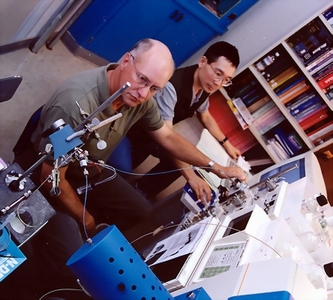Peptide and Protein Characterization
Formats: Self-Paced
Fee: $1,300 USD
![]()
 As with all Mass-spec-training.com courses, Peptide and Protein Characterization with Mass Spectrometry offers relevant, practical approaches that scientists can use immediately in the lab. The course is available as a two-day classroom format or a four-week live-on-the-web course. You may also contract with us to present a private session of the course exclusively for your organization either in-person or on the web. In this case, some degree of customization of the course material is possible in order to address your specific needs and problems.
As with all Mass-spec-training.com courses, Peptide and Protein Characterization with Mass Spectrometry offers relevant, practical approaches that scientists can use immediately in the lab. The course is available as a two-day classroom format or a four-week live-on-the-web course. You may also contract with us to present a private session of the course exclusively for your organization either in-person or on the web. In this case, some degree of customization of the course material is possible in order to address your specific needs and problems.
Who Should Attend
Protein chemists who are new to mass spectrometry or are considering LC/MS or MALDI will benefit from this introduction to the technique. Experienced MS analysts who find themselves confronting protein analysis problems will also benefit from the practical advice and applications overview. All attendees will come away with a basic knowledge of state-of-the-art approaches to protein analysis by MS and will find the well-organized course manual a useful tool to have in the lab as well as an invaluable source of references.
How You'll Benefit from This Course:
- Overiew of mass spectrometry fundamentals plus the operational specifics of mass analyzers and LC/MS and MALDI sample introduction systems employed for protein analysis. Discussions and examples also include the latest micro and nano-scale systems.
- Practical advice on development of HPLC methods compatible with LC/MS—sample preparation, solvent systems, columns and sample considerations which minimize ion suppression effects and interferences in the mass spectrum. The effects of different sample matrices in MALDI will also be discussed.
- Interpretation of protein mass spectra including sequencing by MS/MS, calculation of molecular weight from multiple-charge ion electrospray spectra, electron-capture and electron-transfer dissociation, and other leading edge applications. Important examples of how amino acid content and sequence may affect results are given.
- Presentation of various laboratory techniques combining digestion, hydrolysis and derivitization with mass spectrometry to elucidate sequences, cysteine status and post-translational modifications.
- Data system applications and Internet resources for analysis of protein mass spectra and links to databases for determination of unknown peptides and proteins.
Course Topics:
- Introduction/Review of Protein Chemistry: amino acids; peptide chemistry and mass determination; protein structure: primary, secondary, tertiary, quaternary; transcription, translation, post-translational modifications.
- Mass Spectrometry Fundamentals: atoms, molecules, ions; the mass spectrum; isotopes and their importance in MS; fragmentation and interpretation in MS.
- Mass Spectrometric Analyzers: transmission quadrupole; quadrupole ion trap; linear ion trap; Orbitrap, FT-ICR; and time-of-flight
- Ionization and Inlet Techniques: matrix assisted laser desorption ionization (MALDI); electrospray (ES); nanoelectrospray; ETD and ECD
- Applications Overview: molecular weight determination; mass mapping; peptide sequencing; cysteine status determination; investigation of non-covalent interactions.
- Optimizing Mass Spectrometric Results for Peptides and Proteins: Optimization of electrospray methods including choice of ionization mode and dealing with ion suppression effects; MALDI matrix considerations and method development procedures
- Protein data analysis and database tools: integrated MS data acquisition and analysis systems; off-line software tools; internet software tools.
What attendees are saying...
“This course was great. I learned a lot and this will help me with the work I do in the lab on a routine basis” -- Michelle Irwin, Genentech
"This course is a good primer for those looking into the field." -- Michael Evans, Senior Scientist, Cargill Company
“For complicated and detailed information the training was great. Well organized. Thank you!”-- Jennifer Moore, Genentech
Instructor: Fred Klink
